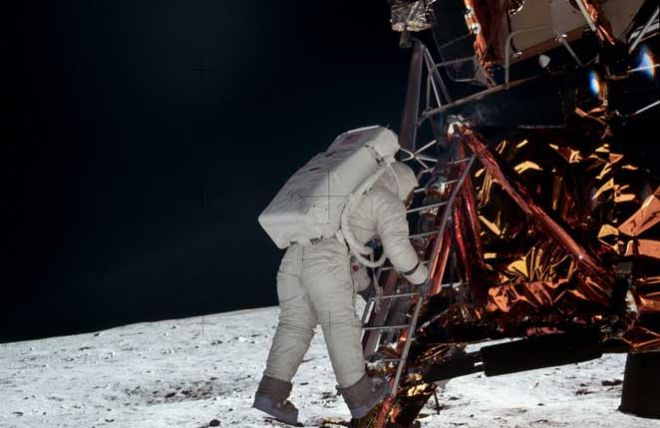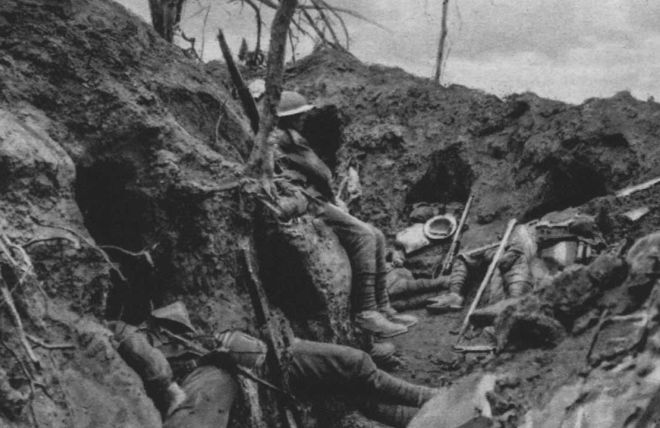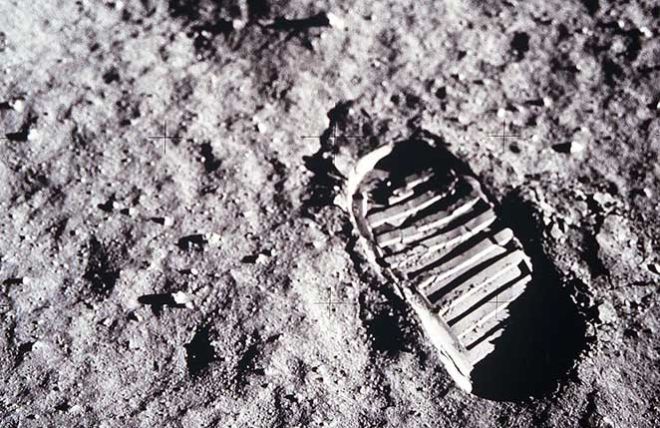Ten years ago today Neil Armstrong passed away. It got me thinking....
In mid-July 1969, I sat spellbound before our family television for hour after hour. The Vietnam War continued..., the UK had recently severed relations with Rhodesia (largely over the issue of white supremacy). I don't recall whether I knew it, but the Concorde had made its first test flight earlier that year. And in mid-July, I watched as two human beings set foot on the moon. The Universe seemed boundless with opportunity. Surely we would journey to Mars and beyond during my lifetime.
The crew and technology was American, but for a few days in 1969, the peoples of the world cheered for one team..., "our" team. It was indeed a "giant leap for mankind". Armstrong's footprint in the distant dust was the footprint of every Smith, Chen, Okonjo, and Shah on the planet, and spoke to our potential to turn our "conquering instincts" to the eradication of war, poverty, and human suffering. The residents of the small blue orb that Apollo 8 had shown us, had landed on a distant Sea of Tranquility for the first time.

Neil Armstrong : July 20, 1969 Sea of Tranquility
Make no mistake. These were brave men, who were traveling at the absolute limits of the technology of the day. The in flight guidance computer possessed only 2kb of memory, driven by 32kb of what we would call Read Only Memory. All programming was in machine language. There was simply no room for the luxury of a high-level language like C (which coincidentally began development in 1969). Neil Armstrong, who passed away earlier this week, later stated that he viewed the probability of successfully completing the mission as a 50:50 proposition. No less than early mariners who sailed over the horizon to Terra Incognita, the voyagers of Apollo 11 journeyed to expand our knowledge and understanding. The benefits of curiosity accrued to all. Curiosity and exploration put a tomato in your Greek Salad, and curiosity and exploration brought you GPS, MRI machines, and the Iphone.
Later in 1969, the first message would be sent over ARPANET, the precursor to the Internet which is so fundamental to today's society, and the medium through which a woman in Moscow can read these musings moments after they are committed to the digiverse. 1969 was a time to believe in possibilities.
2012 seems a period of little vision and less courage.
We live in a world that reduces expenditures on research. The U.S. Congress has cancelled G.W. Bush's proposed return to the Moon by the year 2020. President Obama has suggested we might orbit Mars by the mid 2030's. "Yes, we can?"... sounds more like "That's really hard dude." The government of Canada has reduced scientific spending and hollowed out its environmental legislation out of fear that these expenditures would impact on short term economic indicators in the resource based economy.
We live in a world where nations become an obstacle to advancement because government fears the economic outcome in the 1st quarter of 2013.
Clearly we live in times of economic challenge, but these economic challenges were brought about by market manipulations and the blatant pursuit of profit by individuals and corporations making little contribution of value to the human mosaic. My mother was a child of the Great Depression and certainly taught me the value of thrift and careful financial planning. I expect that from my government. She also taught me the value of the long view of investment. I expect that from my government. Research, science, and exploration have yielded astonishing benefits to the day to day life of the inhabitants of this planet. Can we predict what the innovations and results of journeying to Mars would be? - No more than we could have predicted that developing imaging systems for our early Mars missions would allow us to read two millennia old Roman manuscripts. The quest for knowledge leads to unanticipated benefits.
Wouldn't it be marvelous if we thought about the payoff in the 4th quarter of the 21st Century? In 1969, some 240,000 miles from Earth, Neil Armstrong showed we could.
Teach your children to dream and explore. Think about the legacy you will leave to your grandchildren. Demand that politicians support research and innovation..., that they act in the best interests of future generations.
RIP Neil Armstrong





